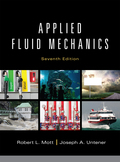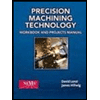
EBK APPLIED FLUID MECHANICS
7th Edition
ISBN: 8220100668340
Author: UNTENER
Publisher: PEARSON
expand_more
expand_more
format_list_bulleted
Concept explainers
Textbook Question
Chapter 7, Problem 7.35PP
Compute the power removed from the fluid by the press
Expert Solution & Answer
Want to see the full answer?
Check out a sample textbook solution
Students have asked these similar questions
1. Consider a
circular shaft in torsion
that
of radius r=b
has a key way
as shown,
circle of
radius a
Let us try the solution
x₁
(5,0) = k (6² = r²) (1- 2 awso
1.1 Does this solve the problem for the
stres rer
1,2 Solve for
is and 23.
3.
-
a
For
an elliptical cross
that
the
tangent to
section
resultant shear
can
you s
stress is
show
ellipse with the same
24
i ratio of
eccentricity, in
passes through to point
alb
that
in question, it
+
P
2.
Consider the rod with an elliptical
that
strain
4
a
Cross
secton
considered in class, Integrate the
was
displacement
displacements,
relations to
obtain the
Chapter 7 Solutions
EBK APPLIED FLUID MECHANICS
Ch. 7 - A horizontal pipe carries oil with a specific...Ch. 7 - Water at 40 F is flowing downward through the...Ch. 7 - Find the volume flow rate of water exiting from...Ch. 7 - A long DN 150 Schedule 40 steel pipe discharges...Ch. 7 - Figure 7.14 shows a setup to determine the energy...Ch. 7 - A test setup to determine the energy loss as water...Ch. 7 - The setup shown in Fig. 7.16 is being used to...Ch. 7 - A pump is being used to transfer water from an...Ch. 7 - In Problem 7.815 (Fig. 7.17), if the left-hand...Ch. 7 - A commercially available sump pump is capable of...
Ch. 7 - A submersible deep-well pump delivers 745 gal/h of...Ch. 7 - In a pump test the suction pressure at the pump...Ch. 7 - The pump shown in Fig. 7.19 is delivering...Ch. 7 - The pump in Fig. 7.20 delivers water from the...Ch. 7 - Repeat Problem 7.14, but assume that the level of...Ch. 7 - Figure 7.21 shows a pump delivering 840L/min of...Ch. 7 - Figure 7.22 shows a submersible pump being used to...Ch. 7 - Figure 7.23 shows a small pump in an automatic...Ch. 7 - The water being pumped in the system shown in Fig....Ch. 7 - A manufacturer's rating for a gear pump states...Ch. 7 - The specifications for an automobile fuel pump...Ch. 7 - Figure 7.26 shows the arrangement of a circuit for...Ch. 7 - Calculate the power delivered to the hydraulic...Ch. 7 - Water flows through the turbine shown in Fig....Ch. 7 - Calculate the power delivered by the oil to the...Ch. 7 - What hp must the pump shown in Fig. 7.30 deliver...Ch. 7 - If the pump in Problem 7.26 operates with an...Ch. 7 - The system shown in Fig. 7.31 delivers 600 L/min...Ch. 7 - Kerosene (sg = 0.823 ) flows at 0.060m3/s in the...Ch. 7 - Water at 60 F flows from a large reservoir through...Ch. 7 - Figure 7.34 shows a portion of a fire protection...Ch. 7 - For the conditions of Problem 7.31 and if we...Ch. 7 - In Fig. 7.35 kerosene at 25 F is flowing at 500...Ch. 7 - For the system shown in Fig. 7.35 and analyzed in...Ch. 7 - Compute the power removed from the fluid by the...Ch. 7 - Compute the pressure at point 2 at the pump inlet.Ch. 7 - Compute the pressure at point 3 at the pump...Ch. 7 - Compute the pressure at point 4 at the press...Ch. 7 - Compute the pressure at point 5 at the press...Ch. 7 - Evaluate the suitability of the sizes for the...Ch. 7 - The portable, pressurized fuel can shown in Fig....Ch. 7 - Professor Crocker is building a cabin on a...Ch. 7 - If Professor Crocker's pump, described in Problem...Ch. 7 - The test setup in Fig. 7.39 measures the pressure...Ch. 7 - If the fluid motor in Problem 7.44 has an...Ch. 7 - A village with a need for a simple irrigation...Ch. 7 - As a member of a development team for a new jet...Ch. 7 - A fire truck utilizes its engine to drive a pump...Ch. 7 - A home has a sump pump to handle ground water from...Ch. 7 - In Problem 6.107 an initial calculation was made...Ch. 7 - A creek runs through a certain part of a campus...Ch. 7 - A hot tub is to have 40 outlets that are each 8 mm...Ch. 7 - A large chipper/shredder is to be designed for use...
Knowledge Booster
Learn more about
Need a deep-dive on the concept behind this application? Look no further. Learn more about this topic, mechanical-engineering and related others by exploring similar questions and additional content below.Similar questions
- Please answer Oxygen at 300 kPa and 90°C flowing at an average velocity of 3 m/s is expanded in an adiabatic nozzle. What is the maximum velocity of the oxygen at the outlet of this nozzle when the outlet pressure is 60 kPa? Use the table containing the ideal gas specific heats of various common gases. The maximum velocity of the oxygen at the outlet of this nozzle is 532.5 Numeric ResponseEdit Unavailable. 532.5 incorrect.m/s.arrow_forwardA container filled with 70 kg of liquid water at 95°C is placed in a 90-m3 room that is initially at 12°C. Thermal equilibrium is established after a while as a result of heat transfer between the water and the air in the room. Assume the room is at the sea level, well sealed, and heavily insulated. NOTE: This is a multi-part question. Once an answer is submitted, you will be unable to return to this part. Determine the amount of heat transfer between the water and the air in the room. The amount of heat transfer between the water and the air in the room is kJ.arrow_forwardA strain gauge rosette that is attached to the surface of a stressed component gives 3 readings (ɛa = A, b = B, &c = C). If the strain gauge rosette is of the D° type (indicating the angle between each of the gauges), construct a Mohr's Strain Circle overleaf. You should assume that gauge A is aligned along the x-axis. Using the Mohr's Strain Circle calculate the: (i) principal strains (ε1, 2)? (ii) principal angles (1, 2)? You should measure these anticlockwise from the y-axis. (iii) maximum shear strain in the plane (ymax)?arrow_forward
- Q1. If the yield stress (σy) of a material is 375MPa, determine whether yield is predicted for the stresses acting on both the elements shown below using: (a) Tresca Criterion (b) Von Mises Criterion P Element A R S Element B Note: your values for P (vertical load on Element A) should be negative (i.e. corresponding to a compressive vertical load).arrow_forwardQ. After a puncture a driver is attempting to remove a wheel nut by applying a force of P KN to one end of a wheel brace as shown in Fig. 1. In cross-section the brace is a hollow steel tube (see section aa) of internal diameter r mm and external diameter q mm. wheel nut n Position S P m r q Section aa Fig, 1 (a) Calculate (i) the twisting moment, (ii) the bending moment, and (iii) the shear force in the brace at position S due to the applied load P. (b) Calculate (i) the shear stress due to twisting, and (ii) the bending stress at position S. Note that the shear force will not produce any shear stress at S. (c) Calculate the maximum shearing stress in the brace at position S using the Maximum Shear Stress Criterion. 2 Mechanics of Materials 2 Tutorials Portfolio: Exercise 5 (d) If the maximum permissible shear stress in the steel is 200 MPa, determine the maximum torque that can be applied by the brace without the risk of failure at S.arrow_forwardCalculate the first 5 Fourier series coefficients (A0-4 and B1-5 ) for the estimated R wave.arrow_forward
- Refrigerant-134a is expanded isentropically from 600 kPa and 70°C at the inlet of a steady-flow turbine to 100 kPa at the outlet. The outlet area is 1 m2, and the inlet area is 0.5 m2. Calculate the inlet and outlet velocities when the mass flow rate is 0.65 kg/s. Use the tables for R-134a. The inlet velocity is m/s. The outlet velocity is m/s.arrow_forwardA container filled with 70 kg of liquid water at 95°C is placed in a 90-m3 room that is initially at 12°C. Thermal equilibrium is established after a while as a result of heat transfer between the water and the air in the room. Assume the room is at the sea level, well sealed, and heavily insulated. NOTE: This is a multi-part question. Once an answer is submitted, you will be unable to return to this part. Determine the final equilibrium temperature. Use the table containing the ideal gas specific heats of various common gases. The final equilibrium temperature is °C.arrow_forwardSteam at 100 psia and 650°F is expanded adiabatically in a closed system to 10 psia. Determine the work produced, in Btu/lbm, and the final temperature of steam for an isentropic expansion efficiency of 80 percent. Use steam tables. The work produced is Btu/lbm. The final temperature of steam is °F.arrow_forward
- Complet the solution : Vavg Ti Te Ts Q hexp Nuexp htheo Re Nutheo Error (m/s) (*C) (*C) (*C) (W) 2.11 18.8 21.3 45.8 2.61 18.5 20.8 46.3arrow_forwardA 48-kg iron block and a 76-kg copper block, both initially at 80°C, are dropped into a large lake at 15°C. Thermal equilibrium is established after a while as a result of heat transfer between the blocks and the lake water. Determine the total entropy change for this process. The specific heat of iron at room temperature is cp = 0.45 kJ/kg·K. The specific heat of copper at 27°C is cp = 0.386 kJ/kg·K. The total entropy change for this process is kJ/K.arrow_forwardPlease help Air at 4.4 MPa and 500°C is expanded in an adiabatic gas turbine to 0.2 MPa. Calculate the maximum work that this turbine can produce in kJ/kg. Use the table containing the ideal gas specific heats of various common gases. The maximum work that this turbine can produce is kJ/kg.arrow_forward
arrow_back_ios
SEE MORE QUESTIONS
arrow_forward_ios
Recommended textbooks for you
 Refrigeration and Air Conditioning Technology (Mi...Mechanical EngineeringISBN:9781305578296Author:John Tomczyk, Eugene Silberstein, Bill Whitman, Bill JohnsonPublisher:Cengage Learning
Refrigeration and Air Conditioning Technology (Mi...Mechanical EngineeringISBN:9781305578296Author:John Tomczyk, Eugene Silberstein, Bill Whitman, Bill JohnsonPublisher:Cengage Learning International Edition---engineering Mechanics: St...Mechanical EngineeringISBN:9781305501607Author:Andrew Pytel And Jaan KiusalaasPublisher:CENGAGE L
International Edition---engineering Mechanics: St...Mechanical EngineeringISBN:9781305501607Author:Andrew Pytel And Jaan KiusalaasPublisher:CENGAGE L Precision Machining Technology (MindTap Course Li...Mechanical EngineeringISBN:9781285444543Author:Peter J. Hoffman, Eric S. Hopewell, Brian JanesPublisher:Cengage Learning
Precision Machining Technology (MindTap Course Li...Mechanical EngineeringISBN:9781285444543Author:Peter J. Hoffman, Eric S. Hopewell, Brian JanesPublisher:Cengage Learning

Refrigeration and Air Conditioning Technology (Mi...
Mechanical Engineering
ISBN:9781305578296
Author:John Tomczyk, Eugene Silberstein, Bill Whitman, Bill Johnson
Publisher:Cengage Learning

International Edition---engineering Mechanics: St...
Mechanical Engineering
ISBN:9781305501607
Author:Andrew Pytel And Jaan Kiusalaas
Publisher:CENGAGE L

Precision Machining Technology (MindTap Course Li...
Mechanical Engineering
ISBN:9781285444543
Author:Peter J. Hoffman, Eric S. Hopewell, Brian Janes
Publisher:Cengage Learning
What is entropy? - Jeff Phillips; Author: TED-Ed;https://www.youtube.com/watch?v=YM-uykVfq_E;License: Standard youtube license